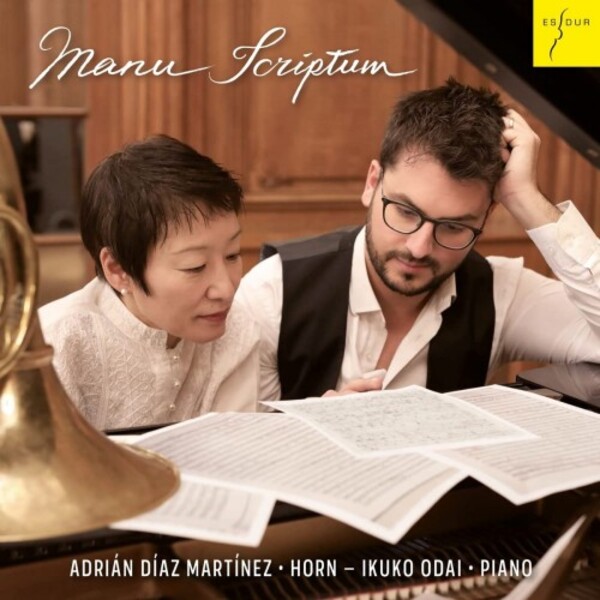
Manu Scriptum: Works for Horn & Piano
£12.83
In stock - available for despatch within 1 working day
Despatch Information
This despatch estimate is based on information from both our own stock and the UK supplier's stock.
If ordering multiple items, we will aim to send everything together so the longest despatch estimate will apply to the complete order.
If you would rather receive certain items more quickly, please place them on a separate order.
If any unexpected delays occur, we will keep you informed of progress via email and not allow other items on the order to be held up.
If you would prefer to receive everything together regardless of any delay, please let us know via email.
Pre-orders will be despatched as close as possible to the release date.
Label: Es-Dur
Cat No: ES2086
Format: CD
Number of Discs: 1
Genre: Chamber
Release Date: 29th July 2022
Contents
Works
Melodies (6)Poemi (3)
Adagio and Allegro, op.70
Horn Concerto no.2 in E flat major, TRV283 (version for horn and 2 pianos)
Artists
Adrian Diaz Martinez (horn)Ikuko Odai (piano)
Works
Melodies (6)Poemi (3)
Adagio and Allegro, op.70
Horn Concerto no.2 in E flat major, TRV283 (version for horn and 2 pianos)
Artists
Adrian Diaz Martinez (horn)Ikuko Odai (piano)
About
This album is inspired by composers' manuscripts and their first sketches and ideas for their works. Díaz Martínez writes: "Interpreting such first musical ideas is a particularly exciting task, because in this way one can trace the original idea of these sounds."
Adrián Díaz Martínez was particularly inspired by a quote by Robert Schumann - on the CD with the original version of his Adagio and Allegro op.70 for horn and piano: "The first concept is always the most natural and the best. The mind misleads, the feeling does not."
"In order to get as close as possible to this first stage of music creation, Ikuko Odai and I embarked on a long and intense search for information about manuscripts, old letters, books and materials that were often kept in hidden drawers. It has been a fantastic journey. Moreover, it proved to be a wonderful opportunity to discover how the selected composers – Charles Gounod, Robert Schumann, Richard Strauss and Volker David Kirchner – thought, what they dreamed of, loved and lived."
Charles Gounod's Six Mélodies for horn and piano are of particular importance to the history of the horn since they were written for the cor à pistons, a more advanced version of the natural horn. This instrument had two valves which made it possible to play chromatic steps on the horn for the first time. In the Six Mélodies, whose sheet music was discovered along with many other melodies for voice and piano in a Paris bookstore, Gounod sought simple melodies which the horn would be able to play always at a pitch typical of the male voice.
The first sketch for the Adagio (Romance) and Allegro op.70 for horn and piano by Robert Schumann recorded on the CD bears a great challenge for the performers: "The greatest obstacle in dealing with Schumann' manuscripts was his complex personality, full of seriousness, skepticism and lack of conformity. We found it extremely difficult and sometimes almost impossible to discern what his original idea for some passages was. Even harmonies were difficult to discern, as he crossed them out and revised them over and over again. Staying loyal to his credo ('The first concept is always the most natural and the best. The mind misleads, the feeling does not') was thus anything but an easy task."
Richard Strauss had a great affinity and love for the horn from his childhood, his father Franz Strauss was a horn player himself after all. The first manuscript of the Second Horn Concerto is dated the 11 November, 1942. The manuscript is privately owned and has remained largely unknown to this day. This CD presents the interpretation of the reviewed copies of the manuscript in a version for horn and two pianos, making it possible to hear all the notes that the composer wrote down.
Composer Volker David Kirchner created his work Tre Poemi for horn and piano in 1986 and 1987. In the three movements - Lamento d'Orfeo, Danza d'Orfeo and La Gondola Funebre - Kirchner here employs techniques with new effects, sounds and colouring that have never been performed before in the repertoire for horn and piano, and hence have never been heard before. Through the Tre Poemi, the ensemble of two instruments becomes one, as it were, as one is completely dependent on the other to create this new three-dimensional sound world.
Error on this page? Let us know here
Need more information on this product? Click here